Case Sharing of the Pioneer Award ⑤

The "BGI Group · 2025 IIOE Digital Higher Education Digitalisation Pioneer Case Award" (hereinafter referred to as the "Pioneer Award") has officially announced its winners. Since its launch, the award has garnered wide attention, receiving 66 valid submissions from 29 countries around the world. A total of 22 outstanding cases from Asia, Africa, and Latin America stood out, including 12 from overseas higher education institutions, 4 from Chinese universities, and 6 from enterprises.This year, one of the world's leading life science and genomics organizations, BGI Group and BGI College, sponsored the IIOE Pioneer Case Award. BGI Group and BGI College are dedicated to life science and genomics research, and cultivate talents for the field. The sponsorship has demonstrated its remarkable support in bringing equitable higher education.
The IIOE places great emphasis on multilateral cooperation, with enterprise partners serving as key drivers of higher education innovation and development, as well as important members within the IIOE. In this edition, we are proud to feature exemplary cases from our four enterprise partners alongside two enterprises honoured with the Outstanding Contribution Award.
UNESCO-ICHEI and Enterprise partners
The International Centre for Higher Education Innovation under the auspices of UNESCO (UNESCO-ICHEI) works closely with leading Chinese enterprises to make cutting-edge technologies available to higher education institutions in developing countries across Asia and Africa on a non-profit basis. By integrating both hardware and software, it continues to explore optimal solutions for applying information and communication technologies (ICT) in higher education, building a bridge between Chinese enterprises and universities in Asia and Africa, and fostering industry–academia integration and innovation.
Case 1 The Xiamen University–Baidu PaddlePaddle AI Education Innovation Centre
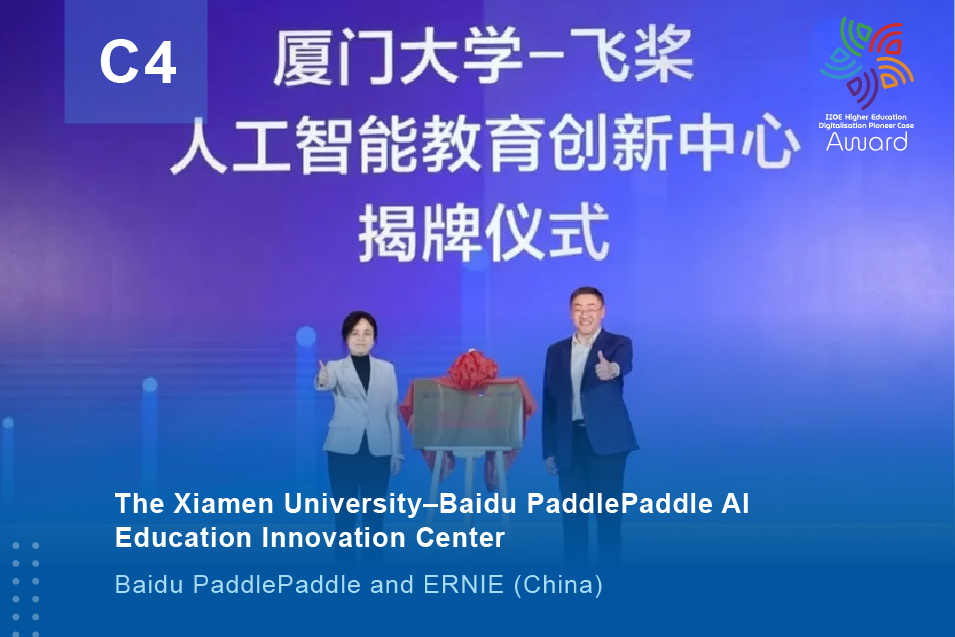
Project Background
As Xiamen accelerates its development as a "Digital Economy Pilot Zone" and a "Cross-Strait Integration Demonstration Zone," artificial intelligence has emerged as a pivotal driver of economic transformation. However, the city still faces structural challenges in AI talent supply. First, existing enterprises require highly capable engineers to facilitate AI-driven transformations. Second, the emerging AI market calls for hybrid talents with native AI thinking and entrepreneurial skills to energize innovation. Third, AI applications permeate all industries, making AI literacy essential for professionals across sectors. In response, the centre launched the following targeted programs: Hybrid AI Talent Development (1+5+500), High-Potential Innovation and Entrepreneurship Program (100-10-1), 1+N Knowledge Diffusion Model (1,000 certified annually). Baidu’s ERNIE large model and PaddlePaddle Team seized the policy window and actively collaborated with Xiamen University, collectively cultivating AI talents for the future.
Project Implementation
The project is structured with a "Learn from Class, Practice, and Society" model that integrates curriculum development, industry-oriented practice, and societal engagement. The project's implementation has been phased and multifaceted: In February 2024, Xiamen University launched its AI general education curriculum with three cohorts, with the opening week featuring keynote addresses by academic and industry leaders alongside Xiamen faculty members. In March 2024, the second curriculum development meeting refined the practical components for the final four weeks of the course through the joint participation of Xiamen University educators and Baidu's research and product teams. By April 2024, an AI Teaching Assistant App, co-developed with Baidu, was introduced in classrooms and quickly adopted by over 150 students within a week. Meanwhile, a physical practice base was established at the Baidu PaddlePaddle (Xiamen) Empowerment Centre, where the program provides structured learning modules ranging from foundational skills to entrepreneurship, coupled with ongoing project incubation.
Project Outcomes
The project has achieved substantial results in curriculum innovation, talent cultivation, and ecosystem building, with notable progress across competency improvement, talent development, curriculum and resource building, industry engagement, and policy impact. Over 150 students have actively participated in the AI General Education Course, engaging deeply with the AI Teaching Assistant app and significantly improving their foundational AI literacy and hands-on capabilities. Internships and project-based collaborations with Baidu and local enterprises are creating direct pathways from education to employment, with student-developed solutions based on real enterprise problems feeding into innovation pipelines. The program has also gained strong support from local governments, including Xiamen and Siming District, further reinforcing the integration of education and industry within municipal innovation policy frameworks.
Jury's Comments: The collaboration involves Xiamen University, Baidu PaddlePaddle, and local governments, forming a tripartite ecosystem that extends to vocational schools and K-12 through the "1+N" model. Incorporates Baidu's ERNIE large model and PaddlePaddle platform, developing an AI Teaching Assistant App that has been adopted by over 150 students, enhancing practical skills.
Case 2 IIOE Micro-Certification Project for Higher Education Workforce Digital Competency
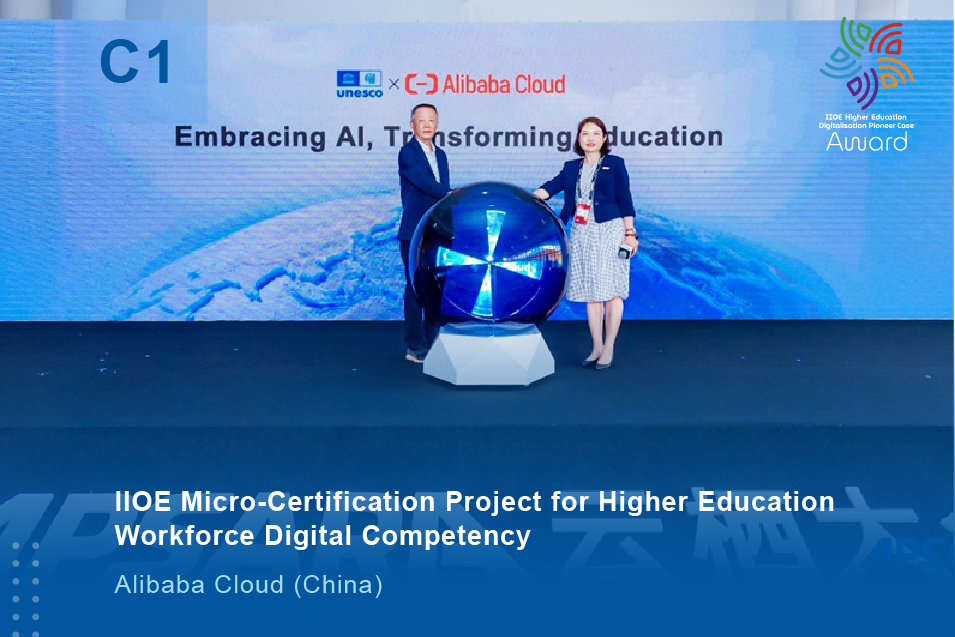
Project Background
The IIOE Micro-Certification Project for Higher Education Workforce Digital Competency initiative, built upon 6 micro-certificate courses developed by Alibaba Cloud, aims to enhance the digital capabilities of higher education educators in Africa, Asia, and Latin America. Many teachers in these regions face significant challenges in integrating modern technologies such as artificial intelligence and cloud computing into their teaching practices. These difficulties often stem from a lack of structured training resources, limited technical foundations, and insufficient institutional support for digital transformation. To address this gap, Alibaba Cloud has completed comprehensive preparatory work on the 6 high-quality courses, covering key areas including Generative AI, data visualization, and cloud computing. Combined with UNESCO's global educational network, the program integrates international standards with industry expertise, enabling educators to gradually acquire the skills needed to effectively incorporate digital tools into real-world teaching scenarios.
Project Implementation
The project is structured into two phases, with Phase 1 (2024) dedicated to the "1+X" Generative AI Series and Phase 2 (2025) focusing on the "AI+Discipline" Series. At the outset of the project, a comprehensive needs assessment was conducted to identify gaps in educators' digital competencies, particularly in relation to Generative AI and AI-integrated disciplines. Drawing on these findings, the team developed systematic course materials: the 2024 courses focused on the foundational concepts of Generative AI and their applications in education, while the 2025 courses expanded into the integration of AI with specific disciplines. Following course development, recording and video production were carried out, after which all content was integrated into the IIOE platform. Once the courses were launched, feedback was collected through surveys and discussion forums, providing valuable insights into their effectiveness. This feedback informed subsequent refinements and adjustments, ensuring the courses remained relevant, effective, and of high quality.
Project Outcomes
During the implementation of the training program on Alibaba's platform, we witnessed remarkable learning outcomes and a significant enhancement in participants' competencies. A total of 604 learners from 56 countries engaged in systematic training focused on Generative AI, through which they deepened their understanding and improved their technical proficiency in this emerging field. It is worth mentioning that these courses have been copied by many well-known universities, which not only promotes the global sharing of educational resources, but also provides students with a valuable platform for communication and learning. In particular, the course "Fundamentals of Generative AI in Higher Education" achieved outstanding results, significantly advancing the professional capabilities and global perspectives of participating learners. The course attracted active engagement from 471 participants across 54 countries, demonstrating its broad international appeal as well as the practical relevance and cutting-edge nature of its content.
Jury's Comments: The 6 modules to assist HEIs integrate AI into their courses and teaching utilize the IIOE micocertification platform and engaged different stakeholders. Students who take the micro-certificates are taught to use new technologies to upskill and improve their competencies.
Case 3 Smart Classroom of Makerere University in Uganda: Promoting Digital Transformation in Higher Education
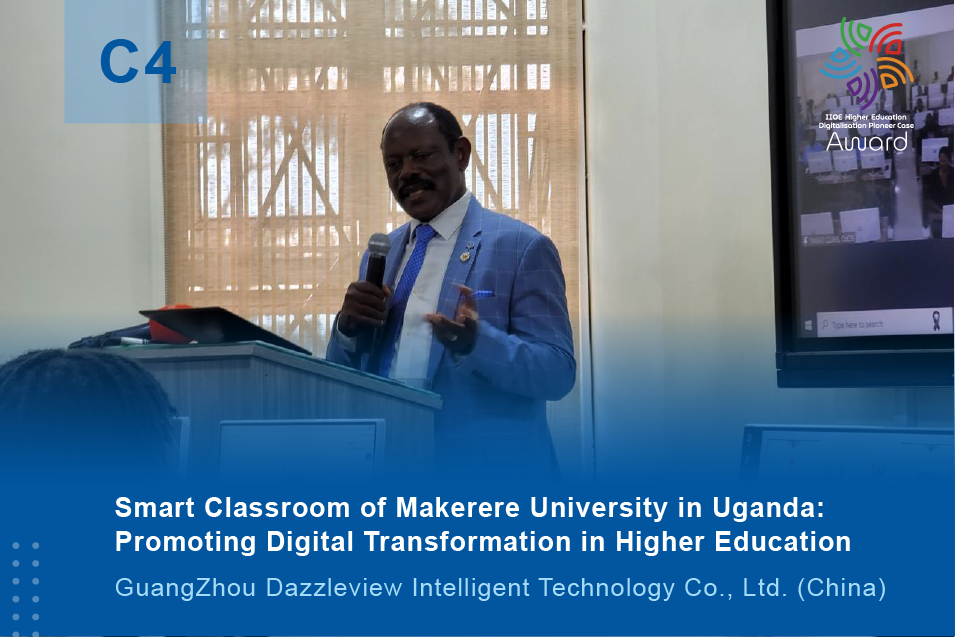
Project Background
In order to promote the digital transformation of higher education and promote educational equity, UNESCO-ICHEI relying on the excellent faculty of Southern University of Science and Technology (SUSTech), cooperated with GuangZhou Dazzleview Intelligent Technology Co., Ltd. to establish the "Dazzleview Smart Classroom". This project aims to enhance the infrastructural facilities of UNESCO-ICHEI's partner Higher Education Institutions (HEIs) in Asian and African countries, strengthen their capacity for designing and implementing online and blended teaching and learning (OBTL), and improve teaching quality.
Project Implementation
Dazzleview Smart Classroom is an interactive teaching solution for Makerere University in Uganda's teachers and students, covering all teaching scenarios before, during and after class, providing efficient and stable technical and product support for the development of digital classrooms, interactive classrooms and synchronous classrooms, and meeting the teaching mode of teacher-student interaction, multi-terminal interconnection and intelligent sharing. Dazzleview provides the following hardware and software to support online and hybrid teaching: Interactive Smart Touch Panel, Desktop Virtual Simulation Training System and Smart Recording System. The IIOE team assists in equipment installation, software training, upgrades and other comprehensive support.
Project Outcomes
Through the deep integration of advanced technology and education, Dazzleview's smart classrooms have driven the digital transformation of higher education in Makerere University in Uganda, enhancing teaching interactivity and learning efficiency. The full-scenario interactive teaching ecosystem it has created demonstrates significant advantages. Through technological integration, it enables the intelligent delivery of pre-class preparation resources, multimodal interaction during class—such as AI-powered real-time Q&A and cross-terminal collaboration—and closed-loop analysis. In terms of adaptive innovation, low-bandwidth synchronous classroom technology has been optimised for local network conditions to ensure teaching stability in remote areas. With regard to scale potential, modular smart classroom solutions have supported the construction of multiple classrooms worldwide, serving both teachers and students while enhancing overall classroom participation.
Jury's Comments: The project provided complete smart classroom solutions, including hardware (interactive touch panels, virtual simulation systems) and software (recording systems), significantly upgrading the teaching environment.
Case 4 Best Tech's Large-Scale XR Smart Classroom Initiative at USG Shared University: Transforming Automotive, Robotics, and Advanced Manufacturing Education
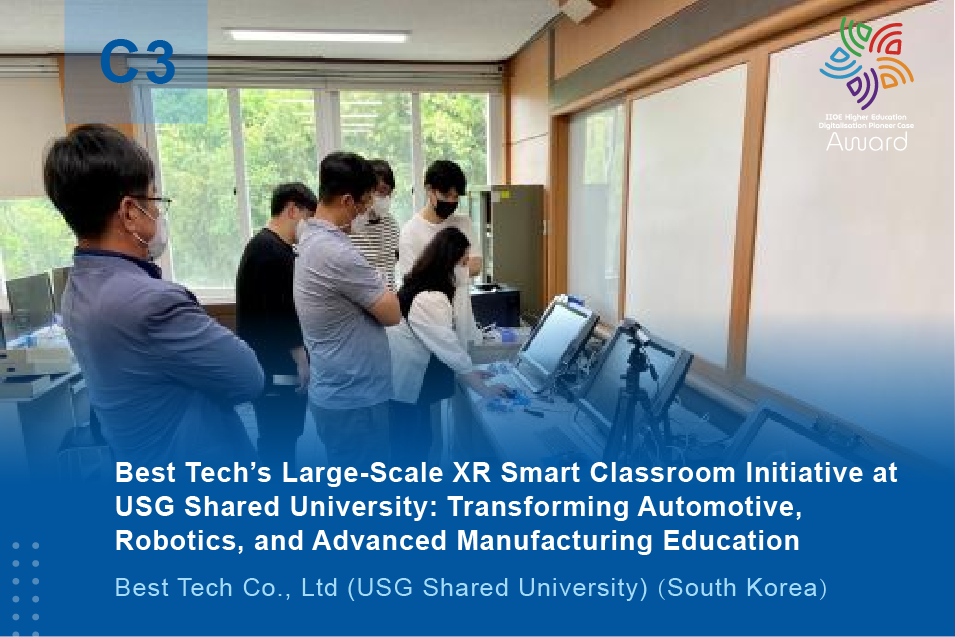
Project Background
Recognizing the urgent need for skilled professionals in fields such as automotive repair (including electric and hybrid vehicles), industrial robotics, and advanced manufacturing, the USG Shared University Consortium in the Republic of Korea identified major limitations in traditional lecture-based teaching and limited physical labs. High equipment costs, safety risks with heavy machinery and high-voltage systems, and restricted access to specialised tools hindered students from gaining sufficient hands-on experience. As a higher education innovation consortium, USG Shared University pools resources across multiple institutions to expand practice-oriented learning. To address these challenges, Best Tech implemented the project across several campuses, leveraging cutting-edge immersive XR technology to provide safe, cost-effective, and realistic training opportunities.
Project Implementation
Best Tech systematically deployed the XR smart classroom solution across the designated engineering and technical departments of multiple universities participating in the USG consortium during the implementation phase. Key installation and setup activities were focused on the primary USG university campuses identified for initial deployment, requiring careful coordination across different institutional sites. The implementation process, representing an investment of approximately 2 billion Korean Won, was executed under the lead of Best Tech Co., Ltd. and involved several critical steps. Best Tech supported the physical space setup and environmental preparation of dedicated smart classrooms at each campus to accommodate the PC-based XR devices, followed by the detailed technical installation and configuration of the respective XR hardware systems. Best Tech assisted with the development, adaptation, or enhancement of existing curricula to effectively integrate the hands-on simulation sessions provided by the XR technology as a core, essential component of relevant technical courses, replacing or supplementing traditional resource-intensive laboratory hours with unlimited virtual practice using the deployed XR hardware and extensive software library.
Project Outcomes
The XR smart classrooms deployed by Best Tech have had a measurable positive impact on technical higher education within the USG consortium. Student learning outcomes have significantly improved, particularly in mastering complex practical skills in automotive, robotics, and manufacturing. Learners developed deeper conceptual understanding (e.g., EV battery management, robotic arm kinematics, hydraulic system operations) and enhanced problem-solving abilities through interactive simulations that enabled fault diagnosis and complex repair or programming strategies. The safe virtual environment allowed unlimited practice of advanced procedures, building confidence and adaptability before working with real equipment. The highly interactive and visually engaging platform increased student motivation, transforming passive learning into active exploration while supporting self-paced progression with immediate feedback. Faculty shifted from traditional lecturers to facilitators, integrating XR-based assignments and monitoring student progress. As a result, graduates gained demonstrable, job-ready competencies directly applicable to high-demand sectors such as EV repair, industrial robotics, and manufacturing maintenance, enhancing employability.
Jury's Comments: The XR (Mixed reality) solution is embedded into existing courses, ensuring a seamless transition between theoretical and practical training, with broad license coverage and campus-level support reflecting strong cross-departmental coordination.
Outstanding Contribution Award
The Pioneer Award 2025 has specially selected two Outstanding Contribution Awards among UNESCO-ICHEI's enterprise partners: Hong Kong Wedon Education Technology Co., Limited (Wedon Education Group) and WisdomGarden Ltd., in recognition of their strong support for UNESCO-ICHEI's flagship projects such as Micro-Certifications and Smart Classrooms, while also taking this opportunity to look ahead at future prospects for cooperation.
Wedon Education Group
Founded in 2012, Wedon Education Group positions itself as a global internet-based education service provider, offering educational resources and services to governments, enterprises, universities, and institutions worldwide. By building an open online education cloud platform, it has established a lifelong learning ecosystem that benefits people globally, with nearly 20 million platform users around the world. As one of the UNESCO-ICHEI’s first strategic partners, Wedon Education Group is currently implementing Smart Classroom projects in six countries across Asia and Africa (Pakistan, Cambodia, Sri Lanka, Egypt, Djibouti, and Ethiopia) and has already planned a second phase, donating six additional Smart Classrooms. Looking ahead, UNESCO-ICHEI will continue working with Wedon Education Group to help higher education institutions build the necessary hardware and software infrastructure to support online and blended learning, thereby accelerating the digital transformation of higher education in developing countries.
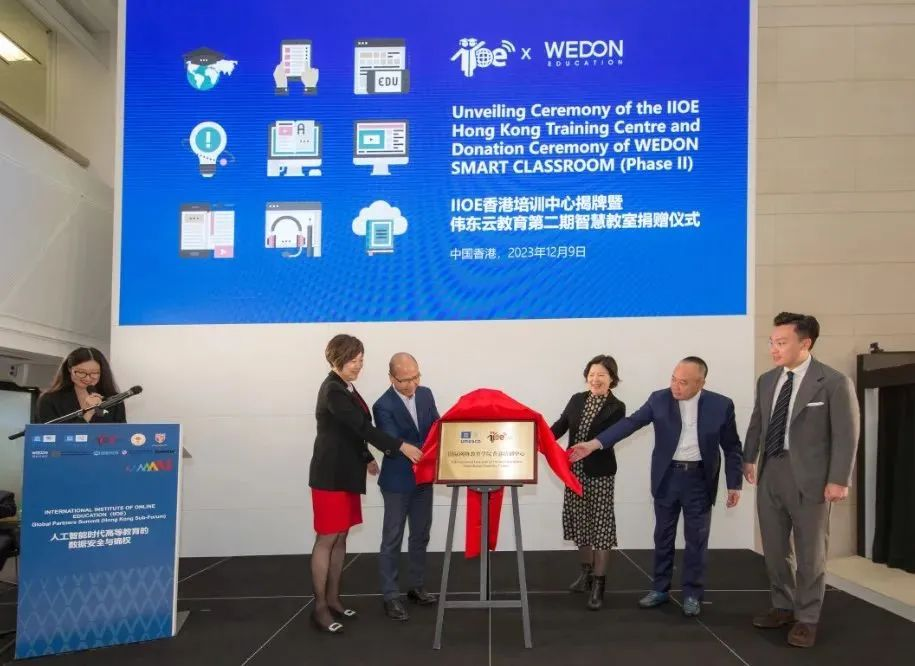
WisdomGarden Ltd.
WisdomGarden has long been dedicated to the field of AI + education technology, focusing on leveraging AI to improve teaching and management, enhance teachers' professional capacity and teaching quality, and enrich students' academic experiences, while serving as an important promoter of industry standards. On 12 June 2025, UNESCO-ICHEI signed a strategic cooperation framework agreement with WisdomGarden. Centered on AI-powered teaching, both sides will engage in in-depth collaboration on multiple fronts, including upgrading Smart Classroom teaching software and jointly developing AI Micro-Certification courses. Through pilot cooperation, the original 6 WisdomGarden Smart Classrooms will be upgraded, continuously providing development models for regional education digital transformation.
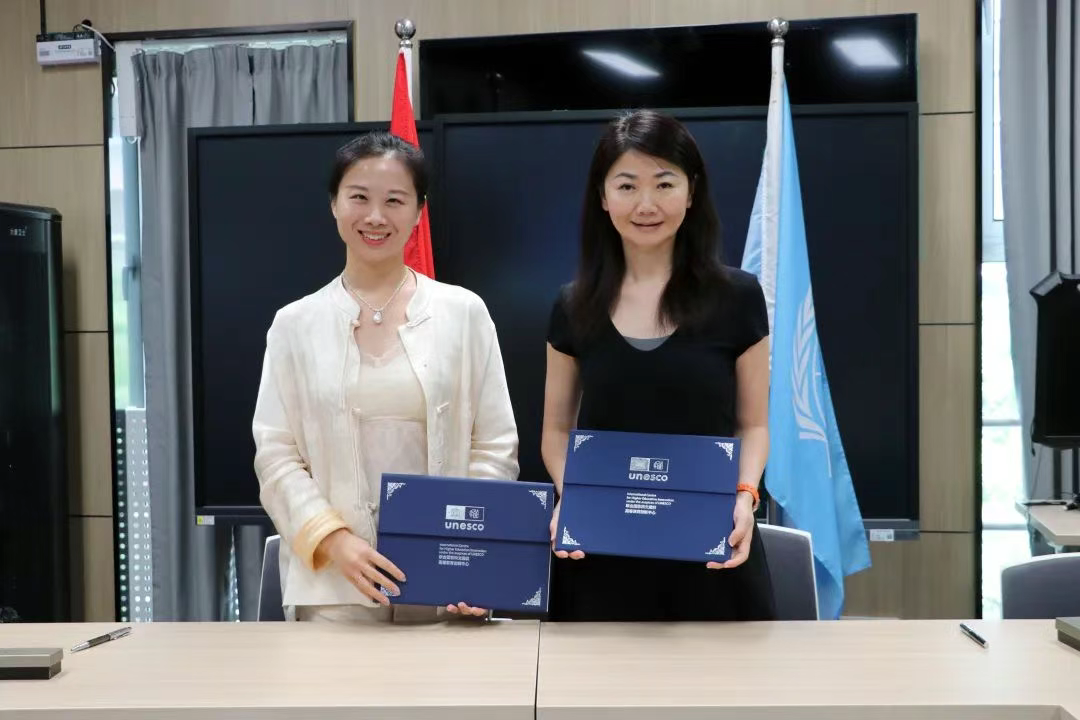
The above presents four excellent enterprise partner cases of the Pioneer Award 2025, along with two enterprises receiving the Outstanding Contribution Award. These cases highlight the crucial role of enterprises and industries in building the IIOE ecosystem. By leveraging their industrial strengths, enterprises support higher education institutions with hardware and teaching-assistive software, improving the teaching experience and environment, fostering pedagogical innovation, or integrating talent needs into higher education training systems.
With this, the introduction of the winning cases of this year's Pioneer Award is complete. Let's look forward to the Pioneer Award ceremony to be held in Singapore on September 1, 2025, join UNESCO-ICHEI and IIOE to celebrate the progress of higher education digitalisation, and look forward to the digital and intelligent future of higher education.
About the Pioneer Award
The IIOE Higher Education Digitalisation Pioneer Case Award is established by UNESCO-ICHEI in Shenzhen, China. This award aims to recognize pioneering efforts that promote educational innovation, digital capacity building, and multilateral collaboration globally through the ecosystem of the International Institute of Online Education (IIOE). Aligned with the evolving trends in higher education, the award is dedicated to identifying and showcasing the latest innovative practices and development achievements among IIOE partners.
The theme of the 2025 Pioneer Award is "IIOE Ecosystem-driven Promising Practices: Empowering Workforce, Innovation, and Collaboration", which aims to recognise achievements of teams and individuals of IIOE partners, who are pioneering IIOE flagship projects to facilitate digital transformation. The award received submissions in four key areas as follows:
Developing Digital and AI Competencies through IIOE Micro-certification
Enabling Localised Digital Empowerment Initiatives through IIOE National Centres
Leveraging Smart Classroom Operations for Teaching and Learning Innovation and Excellence
Strengthening Global Industry-University Collaboration for Higher Education Digital Empowerment.
The award aims to identify leading teams and individuals driving digital transformation in IIOE flagship projects.


